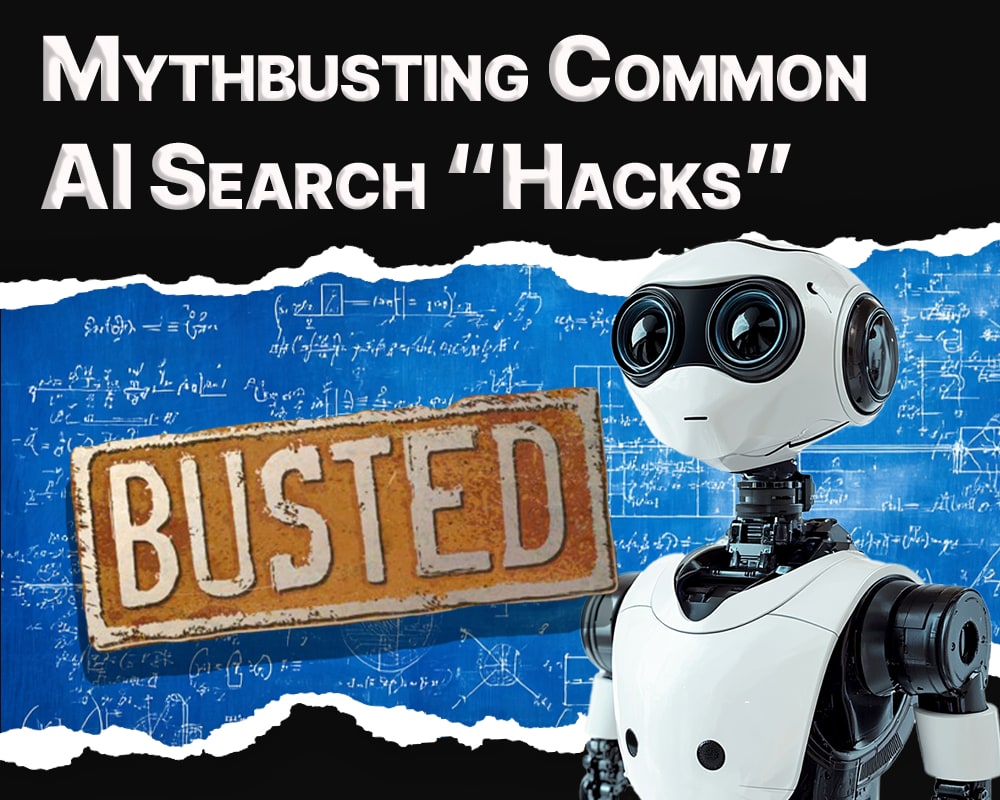AI Search Hacks: Myths, Truths, and What Actually Works

AI Search Hacks: Myths, Truths, and What Actually Works
AI is changing the way people search for information, and with that shift has come a wave of advice, shortcuts, and so-called “hacks” that promise to get your business showing up in AI-generated answers. If you’ve spent any time on YouTube, Reddit, or SEO forums lately, you’ve probably seen bold claims about gaming AI search systems or forcing tools like ChatGPT, Perplexity, or Google’s AI Overviews to recognize your brand. The reality is more complicated. Some of these ideas have a grain of truth behind them while others can steer business owners in the wrong direction.
In this article, we’re going to break down the most talked-about AI search myths and find out what’s real, what’s hype, and what actually helps your business get discovered.
Myth: Parasite SEO on big websites forces AI engines to cite you
What the claim says
A popular idea online is that if you publish content on a large, high-authority website rather than your own domain, AI systems will automatically use that page as a source. The belief is that authority “transfers” instantly, so you can leapfrog the competition.
What the evidence shows
Research does show that AI engines are more likely to cite domains with strong authority signals. But no study confirms that guest-posting or “parasite publishing” guarantees inclusion. Even on major sites, the content still has to be among the best structured and most relevant answers.
Verdict: PLAUSIBLE
Authority helps, but this is not a silver bullet and cannot be relied on as a predictable hack.
Myth: AI-optimized formatting (AEO/GEO) guarantees AI visibility
What the claim says
Many creators teach “answer-engine optimization,” which says that if you structure your page with short paragraphs, lots of Q&A format, and clear passage-level sections, AI will be forced to use your content.
What the evidence shows
Studies comparing AI answer sources to traditional organic results show that content that is cleanly structured, labeled with clear headings, and easy for machines to parse tends to appear more often. Academic research into generative search systems has also found that passage-level clarity does influence which pages are chosen.
Verdict: CONFIRMED
This is not a guarantee, but there is real evidence that well-structured and scannable content improves your chances.
Myth: Getting your brand mentioned on Reddit or Quora is the key to landing in AI results
What the claim says
Some SEO videos claim that since AI systems frequently reference large community platforms, getting brand mentions on Reddit or Quora is a shortcut to being included in AI answers.
What the evidence shows
Early versions of AI answer systems did cite community forums more often, especially for product recommendations and opinions. But recent analyses show a shift toward more authoritative sources for many queries. For local or niche topics, AI systems almost always prefer standard websites, not forums.
Verdict: BUSTED
Forum mentions can help brand visibility, but they are not a reliable or repeatable method for appearing in AI answer summaries.
Myth: Mimicking the exact structure of current AI answers tricks the system into citing you
What the claim says
Some advanced SEO practitioners recommend analyzing the style of an existing AI answer, then formatting your page to match it so closely that the model sees your content as a higher-quality substitute.
What the evidence shows
There is support for the idea that content which mirrors an AI answer’s clarity and structure may become more competitive, but this is an indirect effect. There is no study proving that structural mimicry alone forces the AI to switch sources. At best, it makes your content easier for the system to scan and evaluate.
Verdict: PLAUSIBLE
It may help, but there is no confirmation that this method works reliably or consistently.
Myth: Once your site is cited in an AI answer, you’re locked in permanently
What the claim says
A common misunderstanding is that AI engines “bookmark” your site once they cite you, so you can stop worrying about updating or maintaining your content.
What the evidence shows
AI answer systems change frequently. They update their models, rotate their source lists, and re-evaluate which pages have the best signals. Studies observing AI answers over time show that citations shift, disappear, and reappear as rankings, freshness, and content quality change.
Verdict: BUSTED
AI results are dynamic. If you stop improving your content, you can lose your placement just as easily as you gained it.
Myth: Hiding keywords or Q&A blocks in invisible HTML tricks AI crawlers
What the claim says
A fringe tactic circulating in some forums suggests inserting keywords, headings, or entire passages inside HTML comments or hidden divs so that humans never see them, but bots do.
What the evidence shows
There is no credible research supporting this. Invisible content has a long history of being flagged as manipulative. AI systems still rely on search-engine crawling as a major input, and search engines explicitly discourage tactics that hide content from users.
Verdict: BUSTED
This does not work and could create more problems than benefits.
Myth: Video and podcast transcripts boost AI visibility more than written content
What the claim says
Because modern AI systems are multimodal, some creators claim that videos with transcripts, podcasts, and rich media pages are more likely to be used as AI sources than text-only pages.
What the evidence shows
There is support for the idea that transcripts and rich media improve indexing and provide more material for AI systems to interpret. But consistent research also shows that text-based high-quality articles still make up most citations across AI answer engines. Media is helpful, not dominant.
Verdict: PLAUSIBLE
It can help, but text remains the backbone of AI sourcing.
Conclusion: What Really Matters for AI Visibility
AI search is evolving fast, but the fundamentals of visibility have not changed as much as the hype suggests. The businesses that consistently appear in AI-generated answers are the ones that invest in helpful content, strong site structure, and real authority online (coincidentally the same things that help you rank on Google). While it’s tempting to chase shortcuts or quick wins, most of the so-called “AI hacks” circulating today either exaggerate their impact or misunderstand how these systems actually work. AI models rely on trustworthy signals, and the best way to earn those signals is by building a website and content strategy that genuinely serves your audience.
As AI search continues to roll out across Google, ChatGPT, Perplexity, and other platforms, the most effective path forward is still a long-term one. Keep your site technically sound, publish content that answers real questions, and stay active in the places your customers engage.
If you’re curious about whether people are already finding your business through AI tools, the team at Digital Marketing Charlotte has created a separate guide that explains how you can see whether AI is sending traffic to your site.
If you want help improving your SEO, strengthening your online presence, or you just want to chat about how you can get your business found online, the team at Digital Marketing Charlotte is here to support you. Reach out anytime and we’ll walk you through the strategies that actually move the needle.
Images

